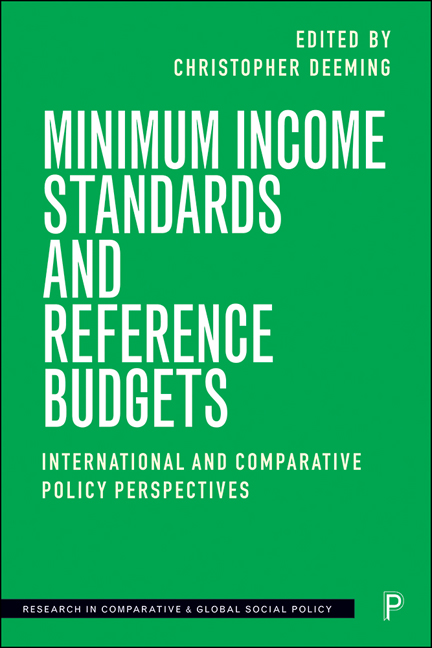23 - Minimum Income Standards and Reference Budgets: Past, Present, Future?
Published online by Cambridge University Press: 12 March 2021
Summary
Introduction
The contributions to this volume help to illustrate the enduring relevance and value of reference budget research. Few can doubt or challenge this ‘common sense’ approach for establishing adequacy benchmarks, and minimum income standards that can help guide the development of national, regional and global social policy. Not having enough money for living in society is our overriding concern. The overall minimum budget, when priced, should attempt to support a specified standard of living. Commodities are translated through prices into budgets. The fewer goods and services that are provided publicly, the more important individual or family income becomes in the reference budget equation. As we have seen throughout the volume, key questions still need to be addressed and answered in order to establish how much is enough, for example: what are the ‘needs’ and ‘necessities’, which commodities or items are required to satisfy them? Where can or should these items be purchased and how much are they likely to cost? How long will they last? And what does all this add up to in terms of a weekly budget to purchase the basket of goods and services? As the contributions to this volume make clear, there are many different ways to answer these questions. The answers do depend in part on who is defining the standards, for whom and how they are doing this methodologically speaking.
Methodological approaches and frameworks
While there is much diversity in the field, and this volume is testimony to that, nevertheless it is also clear that there are longstanding methodological approaches, capturing and reflecting three different forms of input – experiential, normative and behavioural – that are often combined in various ways in order to define or benchmark income adequacy (Deeming, 2005, 2010a, 2011a, 2017). Broadly speaking they are either: (1) public-led, involving deliberative forums or citizens involved in focus group discussions; (2) expert-led, based on research evidence and knowledge relating to the promotion of human needs, good health and well-being, with experts doing much of the deliberating; or (3) survey-led, with social scientists analysing consumption and expenditure patterns observed empirically within social surveys.
- Type
- Chapter
- Information
- Minimum Income Standards and Reference BudgetsInternational and Comparative Policy Perspectives, pp. 333 - 344Publisher: Bristol University PressPrint publication year: 2020



